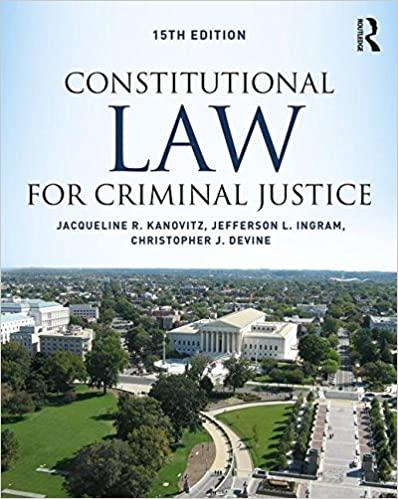Question
The debate on the definition of what constitutes cruel and unusual punishment may go on forever. But, a fundamental question is who or what determines
The debate on the definition of what constitutes cruel and unusual punishment may go on forever. But, a fundamental question is who or what determines the answer to that question. Some Supreme Court justices state that "[I]n a democratic society legislatures, not courts, are constituted to respond to the will and consequently the moral values of the people." Which justice originally stated this (be careful, it is quoted many times but I want the original source).
Renquist
Scalia
Burger
Alito
Douglas
The North Carolina legislature passes a law which states that decides that no one with an IQ of less than 70 may be executed for a crime. This is challenged in court by the State Association of Criminal Prosecutors and it goes all the way to the Supreme Court. The likely result is:
The law will be declared unconstitutional since it is the federal constitution's 8th amendment and not the state of North Carolina which is the final authority on cruel and unusual punishment.
The law will be upheld as this question regarding exclusions to the death penalty has traditionally been a state's prerogative.
The law will be reversed as this question is determined by the courts not the legislatures.
The law will be upheld as state laws cannot be overturned by the SCOTUS only by the North Carolina Supreme Court.
The SCOTUS will return the case to North Carolina for the state Supreme Court to review.
Step by Step Solution
There are 3 Steps involved in it
Step: 1

Get Instant Access to Expert-Tailored Solutions
See step-by-step solutions with expert insights and AI powered tools for academic success
Step: 2

Step: 3

Ace Your Homework with AI
Get the answers you need in no time with our AI-driven, step-by-step assistance
Get Started


